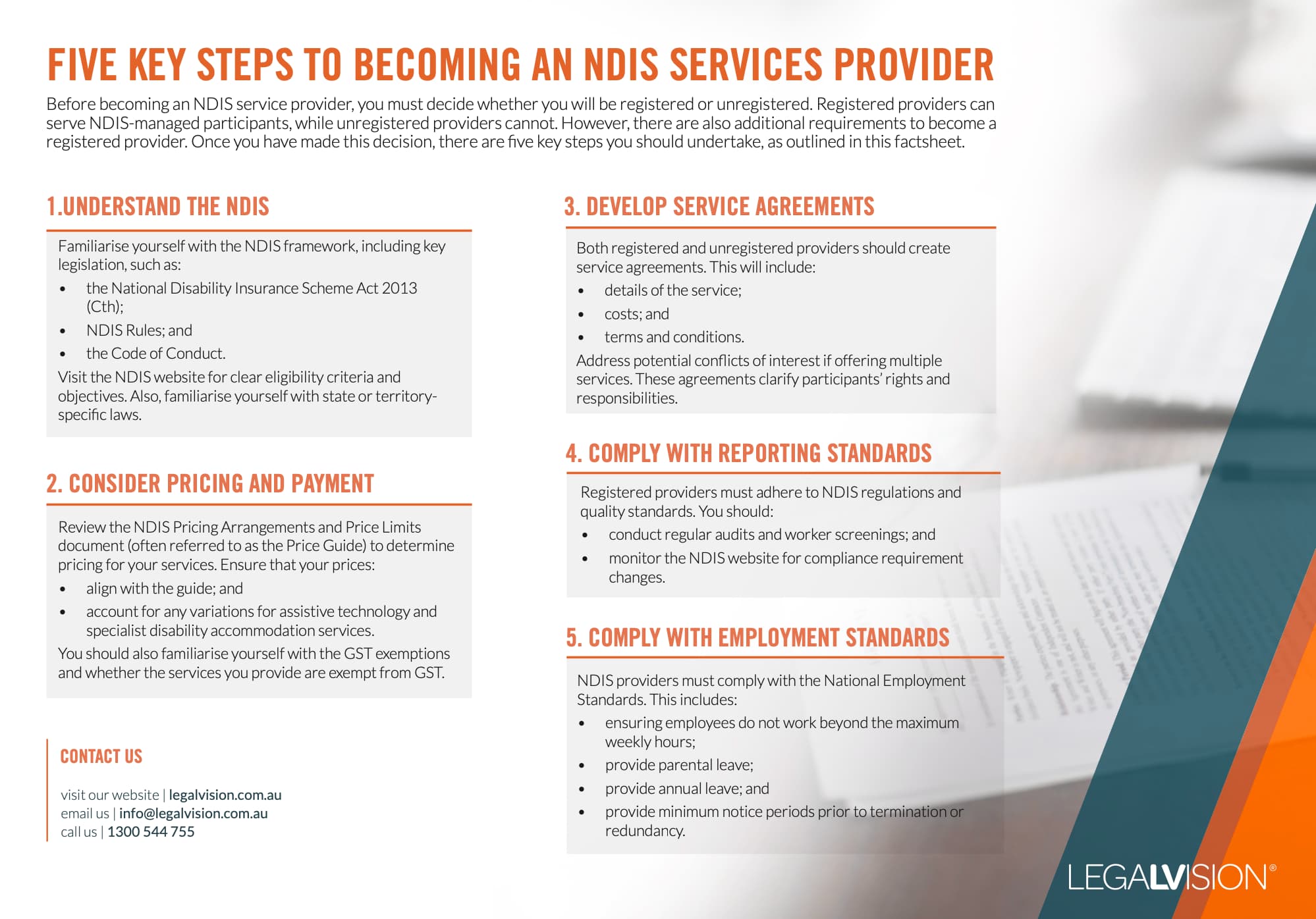In Short
- Understand your legal obligations before launching a home care business, including registration and compliance with NDIS and aged care regulations.
- Choose a suitable business structure and have clear, compliant legal documents in place such as service agreements and staff contracts.
- Stay on top of ongoing compliance by updating internal policies, training staff, and following all relevant codes of conduct.
Tips for Businesses
If you plan to deliver NDIS or aged care services, check whether registration is required before you begin operating. Have the right agreements, policies and privacy measures in place from the outset, and make compliance a regular part of your business operations.
On this page
- What is a Home Care Business?
- Setting Up Your Business
- National Disability Insurance Scheme and Aged Care Quality and Safety Commission
- Legal Documents and Compliance
- Client Services Agreement
- Employment/Contractor Agreement
- Internal Policies
- Privacy Documents
- Key Takeaways
- Frequently Asked Questions
Starting a home care business enables compassionate individuals to make a meaningful impact in their community while building a sustainable career. You might be a healthcare professional, a social worker, or someone with a strong desire to support those who need assistance at home. However, the regulatory landscape for home care services in Australia is complex and can be daunting for new business owners. Failing to comply with legal requirements can result in consequences, including fines, loss of registration, and potential lawsuits.
This article outlines the fundamentals of starting a home care business in Australia, including an overview of business structures, the roles of the National Disability Insurance Scheme and the Aged Care Quality and Safety Commission, essential legal documents, and key compliance requirements to ensure your business operates within the legal framework.
What is a Home Care Business?
A home care business provides essential services to people in their homes. It helps elderly, disabled, or recovering individuals with daily tasks, medical needs, and companionship. Home Care allows clients to maintain independence while receiving necessary support.
Setting Up Your Business
Typically, you can start a business as a sole trader, a partnership, or a company. Each structure affects your taxes and liability protection differently. Setting up a company will give you limited personal liability. If you decide to set up a company, you can lodge an application through the Australian Securities and Investments Commission (ASIC). Note that if you decide to become a NDIS or Aged Care home care service provider, you will need to register the business with the relevant authority, rather than you as the individual provider.
Continue reading this article below the formNational Disability Insurance Scheme and Aged Care Quality and Safety Commission
If you are providing home care services to people with disability or elderly people in Australia, two key organisations shape the home care landscape. The National Disability Insurance Scheme (NDIS) funds support for people with disabilities. It empowers participants to have choice and control over their lives. The Aged Care Quality and Safety Commission (ACQSC) oversees aged care services. It sets standards and handles complaints. Note that ACQSC is transitioning to a new program for home care services called “Support at Home” program and will replace existing programs such as Home Care Packages and Short-Term Restorative Care Programme from 1 July 2025.
Both bodies aim to improve care quality and protect vulnerable individuals. Home Care businesses must understand and comply with their regulations.
| Topic | NDIS | ACQCS – under the Support at Home Program |
| Target population | People who are: + under 65 years old; and + have permanent and significant disabilities. | + people over the age of 65; + an Aboriginal and Torres Strait Islander person over the age of 50; and + a person who is at risk of, or experiencing, homelessness and over the age of 50. |
| Do you need to be registered? | You must be registered if you intend to offer: + specialist disability accommodation (SDA); + specialist behaviour support services; + supports or services to NDIS participants with NDIA-managed funding; and + plan management services. If you do not intend to offer the following services or work with NDIA-managed participants, you do not have to become an NDIS registered provider. | To receive funding under the new Support at Home program, you must be registered with the ACQCS. There is a universal registration process, which means you only need to register once, regardless of the number of programs you offer. |
| Funding | Government-funded scheme. Participants receive individualised budgets. | Government subsidises aged care services. Support at Home program includes increased levels of funding and annual funding amounts per person. Providers set their prices until 30 June 2026. Government-capped pricing will apply from 1 July 2026. |
| Regulatory Framework | NDIS Practice Standards and Quality Indicators; NDIS Code of Conduct. | Aged Care Quality Standards; Aged Care Act 2024; Quality of Care Principles 2014. |
Legal Documents and Compliance
As a home care provider to NDIS and Support at Home participants, you may be subject to audits by the relevant regulatory authorities. These audits ensure you meet quality and safety standards in your service delivery. You need to familiarise yourself with the specific requirements of both the NDIS Commission and the Aged Care Quality and Safety Commission to stay compliant, including ensuring that you have the correct legal documents to protect your business. Even if you are not a registered NDIS provider, you need to comply with NDIS Code of Conduct.
Client Services Agreement
Your Services Agreement outlines the terms between you and your clients (i.e., the participants). It must comply with NDIS and Aged Care regulations.
You should include:
- clear descriptions of services;
- fees (and set out whether they are in accordance with the relevant regulations’ price guide);
- payment process;
- cancellation policies;
- each party’s responsibilities and rights;
- complaint handling process; and
- mandatory reporting requirements.
Review and update this document regularly to ensure compliance with evolving standards.
Employment/Contractor Agreement
If you are engaging staff for your home care business and plan to engage staff or contractors to provide your services to your clients, you will need an employment or a contractor agreement. You should ensure that you outline the obligations for staff to comply with the Code of Conduct for NDIS and Aged Care.
Internal Policies
You need to make sure that you develop robust internal policies and procedures for your home care business. These documents guide your staff in delivering quality care. Key policies include work health and safety policies, incident reporting procedures, conflict policies and staff training records. Keep these up-to-date and easily accessible to all staff.
Privacy Documents
As a home care business, you may come across quite a lot of personal and sensitive information from your clients. You should make sure that you handle your client’s personal information with care and in accordance with the law. You should implement secure systems for storing and transmitting client information. Additionally, you need to ensure that you have a privacy policy which sets out how you handle personal information and whether you disclose personal information to third parties. You should regularly review and update your privacy practices and train your staff on proper handling of personal information.

Understand five key steps you should know to become an NDIS service provider with this free LegalVision factsheet.
Key Takeaways
Starting a home care business in Australia requires careful planning and compliance with complex regulations. Understanding the roles of the NDIS and Aged Care Quality and Safety Commission is crucial, as these bodies significantly shape the home care landscape. You should:
- choose the right business structure;
- consider registering with relevant authorities to provide your services;
- develop all essential legal documents including client service agreements, employment/contractor agreements, internal policies, and privacy documents – all of which must comply with industry standards; and
- ensure ongoing compliance, including staff training, policy updates, and adherence to codes of conduct, is crucial for maintaining a successful and legally compliant home care business.
If you are starting a home care business, our experienced business lawyers can assist as part of our LegalVision membership. For a low monthly fee, you will have unlimited access to lawyers to answer your questions and draft and review your documents. Call us today on 1300 544 755 or visit our membership page.
Frequently Asked Questions
It depends on your services. NDIS registration is mandatory for certain services, such as specialist disability accommodation. For aged care services under the new Support at Home program, you will need to register with the Aged Care Quality and Safety Commission to receive funding. Consult a regulatory lawyer to understand your specific requirements.
To stay informed about regulatory changes in the home care industry, regularly monitor the official websites of the NDIS and the Aged Care Quality and Safety Commission, subscribe to their newsletters, and consult with your legal advisors. Consider joining professional associations and attending industry events to network with peers and gain insights into upcoming changes, as this can help you proactively adapt your business practices to remain compliant.
We appreciate your feedback – your submission has been successfully received.












